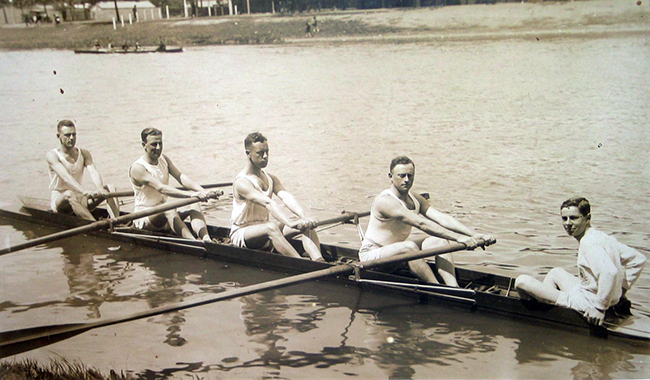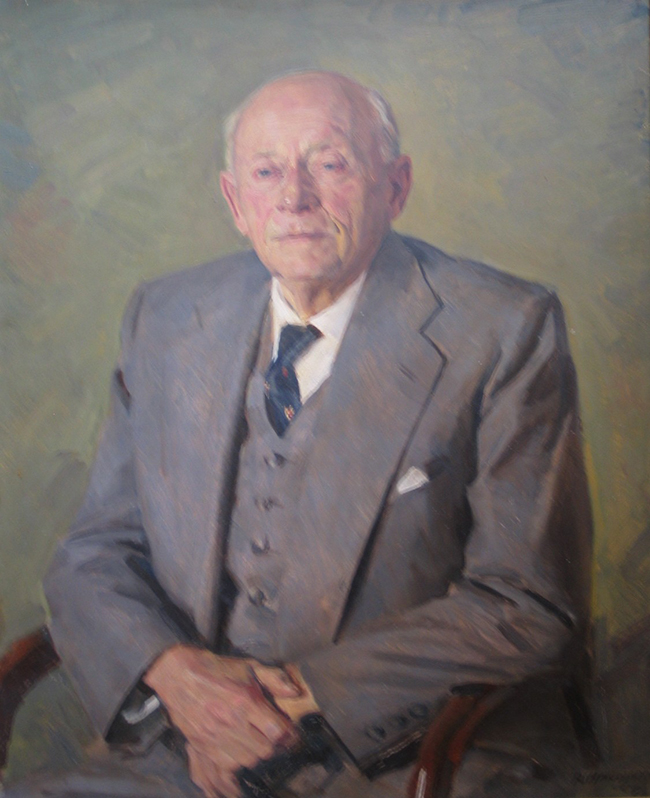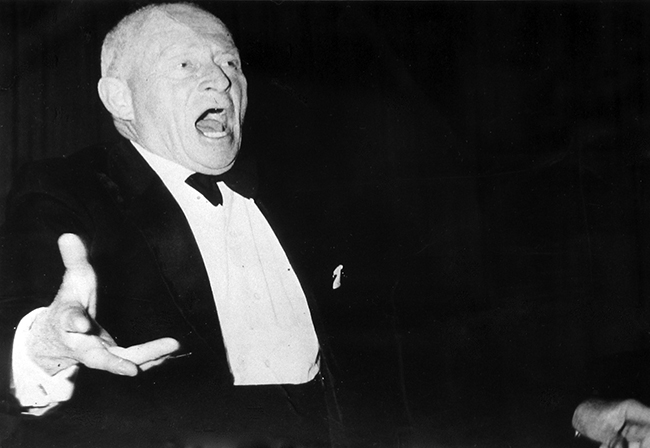James G H Sprigg

Mercantile Rowing Club (Vic)
Never before has a person gained the respect and affection of a Club James Sprigg.
The following is an obituary written by Bob Aitken for the funeral of Jim Sprigg.
It is difficult in the space of just a few minutes to do justice to the long and rewarding life of James Gordon Harvey Sprigg or to cover with any degree of adequacy his many and varied interests.
Jim was born in 1896 and was afforded the opportunity to observe and enjoy nearly a century of change and development in the world around him and in the people in it. That he did both observe and enjoy is I think obvious to all who knew anything of him.
Jim came from pioneer stock, his grandparents having migrated from England in the 1850’s. Both his parents died when he was very young which perhaps in part explains the spirit of independence and of determination to succeed by his own efforts which were characteristics he displayed in business and in leisure during his long life. He was educated as a boarder at the Geelong College [where he rowed in the five seat of the Geelong College first eight in 1913] and on leaving school joined the family firm of hardware merchants Harvey Shaw and Drake. Then followed the First World War and Jim, as did most of his contemporaries enlisted in the A.I.F. and was in active service in France for several years.
On his return from the war Jim joined the staff of G.G. Good & Co. a firm engaged in the tobacco industry. From there he moved to Carreras which was subsequently absorbed by the International Tobacco Co. finishing up as Sales Director with responsibility for a considerable part of the Australian market. Retirement inevitably came but Jim was not one to sit in idle observation of the T.V. screen. He initiated other business interests in which he was fully involved until the last months of his life. Jim had the reputation of being an astute man of business with an interested and enquiring mind. He travelled widely both within and outside Australia and derived much enjoyment from it. His knowledge of men and affairs was extensive and he could converse with authority on a wide range of subjects. For all that he was I think humble and reserved by nature and reluctant to talk of himself and his personal affairs.
Jim was first and foremost a family man. He married his first wife Ethel in 1918 and is survived by five children, 23 grandchildren and 4 great grand children. After the death of his first wife he married a second time in 1949.He had no children by that marriage but Thelma’s two daughters and later their children were all part of his family circle.

Above: James stroking the Club's senior four in 1928
Those who knew him in other areas cannot doubt with what admiration and affection he was regarded by his family and how much he will be missed. I think all his rowing friends of recent years will remember his visits to the Mercantile Rowing Club Christmas Parties with several generations in attendance. Though he never suggested it I sometimes wondered whether he would himself have liked to have been Father Christmas on those occasions and he would certainly have done it very well. His family I am sure have very happy memories of a kind, warm and loving man and our sympathy goes to all of them.
Jim had many other interests. He was a keen supporter of the Lodge being a member of and having held office in the Lodge Henley and in the Lodge Renown. I believe he gave to the Lodge the same enthusiastic support as he did to everything else he undertook.
He had a long life in sport. He was a keen follower of cricket. He played league football for St Kilda and coached the Melbourne second eighteen. On most winter Saturday afternoons he could be found in the member stand at the MCC observing with a critical eye the performance of players. But in the sporting arena he directed most of his interest and effort to rowing and to the Mercantile Rowing Club in particular.

Above: Such was the respect and affection held for Jim Sprigg, the Club commissioned a portrait of him by noted portrait artist Robert Hannaford.
He joined the Club in 1914 and thereafter Mercantile was part of his life and he was certainly a part of the life of Mercantile. He represented the Club in maiden rowing events in 1914 and 1915 before leaving for the war. On his return from active service he was not long in coming back to the river. His rowing career covered the next ten years and he represented the Club in every category of rowing and every class of boat finishing with a successful season in the Senior Eight in 1927 – 28 just 60 years ago. Jim was Captain in 1927 – 28 and again in 1930. His interest thereafter was primarily in administration and in coaching particularly of novice crews, although he did compete again in an Open Eight in 1942. He was elected a Vice President of the Club in 1938 and President in 1955. He held that office with great distinction until 1983 when he stood down at his own wish on the pretext that he was too old, a view not supported by the membership. He was then nominated as the first patron of the Club. He had, however, a wider interest in rowing than just Mercantile and was active in his time both in the Victorian Rowing Association and the Old Oarsman and Oarswoman Association of which he was a Patron.
I don’t think that this bare statement of historical facts does anything like justice to Jim himself. Those who were rowing in the days of his captaincy will recall the enthusiasm which he gave to the task and his great ability to inspire enthusiasm in those about him. We of more recent vintage have many and varied memories. I suppose the first that would spring to the mind of members are the famous speeches at the Annual Meeting which accompanied the presentation of the trophies for the Sprigg time trial, a contest which he initiated when Captain of the Club in 1930 and for which he presented the prizes every year until 1988. We remember at those meetings how Jim would tell the members and anyone else who cared to listen that Mercantile was the mecca of rowing and the occasion when he informed the Lord Mayor who was present at the Annual Meeting that it was a waste of time building the Cultural Centre of Melbourne on the other side of St Kilda Road when everybody knew that it was already at the Mercantile Rowing Club.

Above: Jim Sprigg in full flight presenting the Sprigg time trial trophies
We remember Jim on the river bank on Regatta days exhorting all Mercantile crews on the way to start to greater efforts and points for premiership. We remember Jim at the winter Club Dances leading the members in a spirited rendering of Cock Robin. We remember the welcome of Good Morning when he addressed the members on Sunday mornings and the expectant hush when he rose to speak on more serious occasions. He thrived on interjections and was a master of the quick witted response. How often it was said after listening to one of those gems of oratory that he should certainly have been in Parliament.
We remember the small contributions to Club funds from the disposal of surplus containers and who of those who served with him on the Mercantile Committee over the years can forget his periodical chiding on matters of security, coaches’ bicycles, clean guttering and other points of maintenance, for no detail of the Club was too small for his notice and attention.

Above: Jim Sprigg centre front at his testimonial dinner
Back row: Lance Hill, Doug Brooke, Bill Bradshaw, Hubert Frederico, Phil Ainsworth, Norm Cairnes
Front row: Beane Morgan, Jim Sprigg, Bob Aitken and Andrew Guerin
We remember his enthusiasm for rebuilding the Club and determination to see it finished by the time of the Club Centenary, a process assisted by small boys with a box of matches. We remember Jim at the age of 85 joining the Centenary trip to Henley on Thames and arriving full of fight and without a sign of the jet lag affecting those less than a third his age, and more recently we remember how looking 20 or 30 years ahead he initiated the Endowment Fund with a very handsome contribution.
All these memories were part of Jim Sprigg. To him the Club was more than a just a place to row. As with everything else he did it was the people around him who counted whether it was his family, his Club members or his Lodge. He had a wonderful ability of giving to a new young member the warmest personal welcome and thus ensuring as far as he was able that member as a dedicated Mercantilian forever. I believe that Jim gave much to his family, his Club, his Lodge and his friends and derived much enjoyment from so doing, and that his most earnest desire was that others should be able to give and receive that same enjoyment.
Jim’s independence of spirit was clearly shown until the last days of his life – with the loving care and assistance of his family he was able to go on living at Kensington Road. He maintained his driving licence until earlier this year and travelled both this and last year to America to stay with one of his step-daughters and her family and finally died as he wished in his own home with some of his family around him.
Robert Aitken
6 Dec 1988
If we may be so bold to add to this well written obituary, those of us who had the privilege to know him to add to these stories.
For years at Henley regattas Jim was stationed on the Henley staging, 50 metres to the west of Swan Street bridge on his directors’ chair with his megaphone in hand and wearing his familiar red cap, exhorting Mercantile crews rowing up to the start to remember:
“ Every stroke you row..….you row to win, … to win.”
To hear such words from such a revered man, was always worth a couple of lengths.
The exhortations to “look for the red cap” at regattas and the winning exhortations were critical in creating the winning spirit as the Club sought to re-establish itself from the various fire enforced rebuilds.
His annual general meeting orations of the Sprigg time trial, often conducted within minutes of the meeting commencing, were legendary. Although these days it is difficult to see how his description of arse bones rowing would pass muster, they were the highlight of the night. His commentary on the crew, often stroked by Dick Garrard, seen rounding new cut corner on the way home, was enough to lift the roof off the clubhouse.
And of course whenever he rose to speak to his members he commenced, “Good morning boys”, if it was in the morning of course, to which the response was always in unison, “Good morning Mr Sprigg”.
Compiled by Martin Owen and Andrew Guerin
21 April 2017

